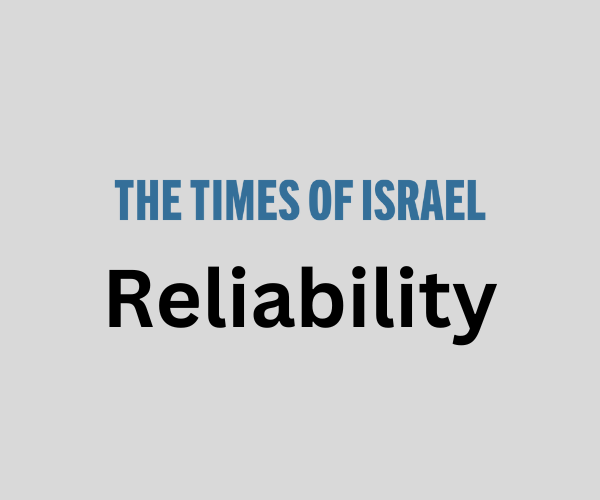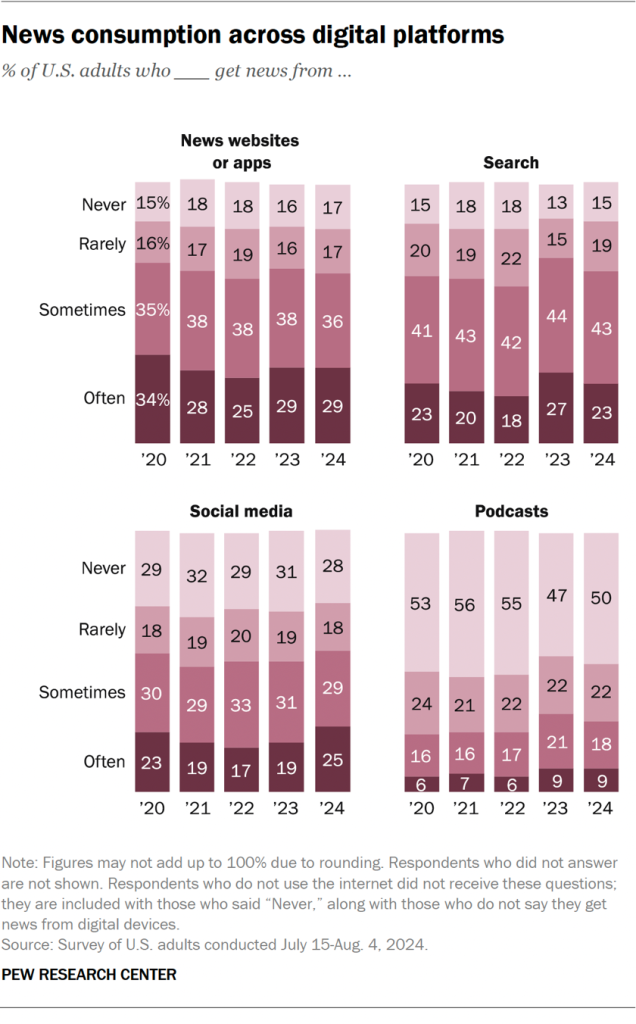
An April 2023 poll by Statistica found that 75% of adults in the U.S. are very or somewhat confident in their ability to distinguish real news from false news.
A study by Pew Research found that the most used form of news consumption for U.S. adults is through digital devices.

Source: Pew Research
In a world dominated by modern technology rapidly changing and challenging boundaries, it is essential to determine the reliability of news sources all throughout the world. As the entire globe watches Israel and its response to the Middle East crisis, The Times of Israel serves as a source of news that many look to for information.
Does Reliability Matter?
Reliability, in general, refers to how trustworthy or accurate information, or in this case, a news source is. If we consider this definition, it quickly becomes clear why reliability is important in media sources. If we can’t trust the things we read then there isn’t much of a point in continuing to consume content from that source, after all. So how exactly can we gauge the reliability of a news source anyway?
There are several potential measures of reliability to look out for when trying to determine whether a media source is reliable or not. Red flags for an unreliable article can include the presence of wild unsubstantiated claims, facts dependent on other unreliable sources, heavy use of opinionated language, and more. Some indicators of a reliable news source, on the other hand, include things like:
- Absence of subjective/opinionated language in articles
- Credible sources cited (e.g., neutral sources, .gov, .edu websites)
- Facts and statistics backed by multiple relevant outside sources
- Use of primary sources when possible (e.g., interviews, quotes)
- Information that remains consistent across news sources
So How Does The Times of Israel Fare in its Reliability?
The political reliability index developed by Biasly objectively assesses news organizations’ accuracy and trustworthiness. The Times of Israel’s overall Reliability Score has been rated as ‘Fair’ by Biasly. This suggests readers can trust some of the sources, links, and quotes provided by the news source. This rating is a weighted average of two distinct scores: the Fact Analysis Score and the Source Analysis Score, each evaluating separate components of The Times of Israel’s Reliability. When computing the Average Reliability of the article the Fact Analysis score is more heavily weighted. These ratings are as follows in the next two paragraphs:
The Times of Israel’s Fact Analysis Score is ‘Fair’, which suggests readers can trust some of The Times of Israel’s content online. The Fact Analysis score focuses more on the accuracy of claims, facts, and sources presented in the article and any hints of selection and omission bias, which we will discuss further in the article.
The Times of Israel’s Source Analysis Score is ‘Fair,’ which suggests readers can trust some of the sources, links, and quotes provided by the news source. This score, which is based on A.I., focuses on assessing the quality of sources and quotes used including their number, lengths, uniqueness, and diversity.
However, since these scores are based on percentages and averages, individual articles could be more or less trustworthy depending on the context, author, and other factors.
Let us analyze the supporting data for The Times of Israel’s bias and reliability rankings and discuss what to watch out for while searching for trustworthy news sources.
The Times of Israel Accuracy and Reliability
The credibility of a news source is reliant on the accuracy and reliability of its content, impacted by bias and political orientation. The Times of Israel is a source that promotes a wide variety of viewpoints and opinions that lean both left and right. Compared to many of its competitors, The Times is seen as a very central news source, with nuanced biases depending on the journalist. We can evaluate the integrity of The Times of Israel’s stories to determine how well the publication supports assertions with evidence and see whether this is indeed the case. We will check for selection and omission bias as we assess the articles’ correctness and factuality.
Selection bias is when stories and facts are selected or deselected, often on ideological grounds, to create a narrative in support of the new sources’ ideology. Omission bias, on the other hand, is when different opinions and political views regarding a situation are left out so that the reader is only exposed to the ideological perspective supported by the author. It’s important to keep in mind these two types of biases when trying to assess an article’s level of accuracy.
Biasly assigns a percentage score to accuracy, with one being the least accurate and 100 being the most. Ratings are calculated by weighing assertions with supporting evidence, the number of reliable internal sources, and the number of reliable external sources employed.
A study titled “Unmasking Media Bias and Religious Zionism’s Impeding Political Influence on the Israeli-Palestinian Conflict“ highlights that Israeli media, including The Times of Israel, is often accused of bias that skews public discourse in favor of hardline Zionist policies. The study suggests that The Times’s framing of news articles may reflect a particular ideological stance, affecting the perceived reliability of the information presented.
The same study conducted a critical discourse analysis of articles from The Times of Israel and other Israeli newspapers during the specific Israeli-Palestinian conflict in October 2023. It found that the language and framing used in these articles often reinforced Israel’s policy preferences and normalized militarized responses to acts of resistance. This indicates that the articles may not provide a balanced view of the conflict, signaling a biased understanding of the situation
The analysis compared The Times of Israel with other Israeli newspapers, such as “Israel Hayom“ and “Jerusalem Post,“ revealing that while all these outlets may exhibit similar biases, the specific framing techniques and narrative constructions can vary. The comparative approach is essential for assessing reliability and highlights the need to evaluate multiple sources to gain a comprehensive understanding of the news.
The perception of reliability can also be influenced by the audience’s prior beliefs and biases. Readers who align with the pro-Israel narrative may view The Times of Israel as a reliable source, while those critical of Israeli policies may perceive it as biased. This subjectivity in audience perception complicates the assessment of reliability.
Analysis of Reliability in The Times of Israel’s Online News Articles
The Times of Israel claims to maintain editorial independence, although it is important to note that it may have a particular perspective, especially regarding Israeli and Jewish issues. The Times of Israel features a range of opinions and columns from various writers, which can provide a broader perspective on issues. However, it is often viewed as having a pro-Israel stance, which may influence its reporting. The Times of Israel is generally regarded as a credible source of news, particularly among those interested in Israeli affairs. However, perceptions can vary widely depending on the reader’s own biases and beliefs. Some critics argue that it may not always provide a balanced view, particularly in its coverage of the Israeli-Palestinian conflict. This is a common critique of many media outlets that cover contentious geopolitical issues. When compared to other news sources, such as Haaretz or The Jerusalem Post, The Times of Israel occupies a unique space. Haaretz is often seen as more left-leaning, while The Jerusalem Post is considered more right-leaning. The Times of Israel tends to appeal to a centrist audience.
Biasly’s “fair” reliability stems from The Times’ lack of opposite and multiple sources, as well as its sources and accuracy. The Times has an excellent rating in regard to its quote length but lacks in its ability to acquire information from unique or opposing sources.
Quality of Sources and Facts Used
In a recent article citing the arrest of two Israeli minors, The Times of Israel focused on the facts. The article avoided any opinion or commentary while focusing on information from The Shin Bet and Israel Police. The article featured three partial quotes and one full quote from Central District Police Commander Chief Superintendent Yair Hatzroni. The quote number, length, and variety of this article is not ideal, but not awful considering the length of the feature. Hatzroni is a very reliable source for this information considering his role in the arrests. The selection of information and data from the October 7th attack is biased toward a pro-Israel narrative but was completely factual and correct.
In November 2024, The Times of Israel published an article condemning Palestinian curriculum and education in schools. This article is excellent at showcasing The Times of Israel’s reliability as a whole, as it follows the general trends that the media company follows.
The article contains eleven quotes from various sources, ten quotes supporting pro-Israel viewpoints, while only one supported pro-Palestinian viewpoints. Quotations and data came from the following sources:
- Luxembourg’s Foreign Minister Xavier Bettel
- Aviva Klompas: Israeli UN representative
- Marcus Sheff, CEO of the London and Tel-Aviv-based Institute for Monitoring Peace and Cultural Tolerance in School Education, better known as IMPACT-se
- European Parliament
- Haaretz, an Israeli newspaper
- Michael Milshtein, head of the Palestinian Studies Forum at the Moshe Dayan Center at Tel Aviv University
- IMPACT-se, the London and Tel-Aviv-based Institute for Monitoring Peace and Cultural Tolerance in School Education
- US State Department
In addition, the article featured a total of fourteen hyperlinks to articles and information, seven of which referred to articles from The Times of Israel, two linked to articles from IMPACT-se, one from X, one from the United Nations Human Rights Office of the Highest Commissioner, and one from the United States National Institute of Health. Many of these sources are highly credible and accurate sources that give objective data. However, there are a fair amount of sources and references that offer biased and unreliable data. Citing itself as a source does not hold credibility or reliability for The Times of Israel.
Some of these sources, like the USNIH and UN, are fairly objective. The links to IMPACT-se, The Times of Israel, and X are fairly left-leaning sources and are very pro-Israel.
A large number of sources support The Times of Israel and its credibility, but their lack of opposing sources raises concern. This leads us into a discussion of The Times and their selection and omission bias.
Selection and Omission Bias
One way to determine accuracy and reliability is by looking at the selection and omission bias of a platform.
By using quotes selectively, articles can display what biases are present. Following the 2024 Presidential Election coverage, The Times published a piece displaying the endorsements Trump had received from world leaders. The tone and tendency of this article leaned toward President Donald Trump and his victories, but more obvious was the selection of quotes used by the author. Quotes of endorsement and congratulations were sourced from Israeli Prime Minister Benjamin Netanyahu, President Isaac Herzog, Finance Minister Bezalel Smotrich, National Security Minister Itamar Ben-Gvir, New Hope chairman Gideon Sa’ar, Foreign Minister Israel Katz, National Unity party leader Benny Gantz, and Minister for Jerusalem Affairs and Jewish Heritage Meir Porush. All important Israeli leaders, it seems as though this article is working to convey the mass Israeli support for President Trump.
In an article analyzing Presidential Candidates Donald Trump and Kamala Harris, and their approach to Muslim voters, the majority of the article’s latter was focused on Harris and her support from Michelle Obama. Less time was spent on Trump’s issues, and the quotes used were more biased against Trump. The most biased piece of the article was when Harris said,
“Over the last eight years, Donald Trump has become more confused, more unstable and more angry, and it is clear he has become increasingly unhinged. But the last time, at least there were people who could control him, but notice they’re not with him this time.”
The strong diction and tone in this quote showcase a strong selection bias that influences the way a reader views Trump.
A recent article from The Times covered a rally held by Donald Trump at Madison Square Garden. The entire article was focused on Trump’s MSG rally as a controversial event that promoted antisemitism and racism, when in reality the examples they give were only a small part of the event. Instead of providing full quotes from individuals speaking at the event, or providing positive dialogue from Donald Trump, the author decided to omit any positive views of the event. The article was full of strong emotional language, claiming instances of racism, antisemitism, anti-Israel sentiments, Holocaust-denying, bigoted rhetoric, violence, and nativism. The title of the article focuses on antisemitism and nativism from the Trump rally, indicating a clear bias against Donald Trump and many of his allies who spoke at the event. Omitting any positive views or spins from the rally shows the biased rhetoric that the author was attempting to push.
So Is The Times of Israel Reliable?
It can be argued that The Times of Israel is a fairly reliable news source, as it aims to report factual information. It is highly recommended that readers understand the strong biases that The Times of Israel often holds, and take into account the lack of opposing sources or opinions. The more you research media reliability and accuracy, the simpler it will be for you to spot problems with sources, selection, omission, and factuality. To help with this, you can use Biasly’s News Bias Checker to uncover reliability problems and find the most accurate and dependable news.






















